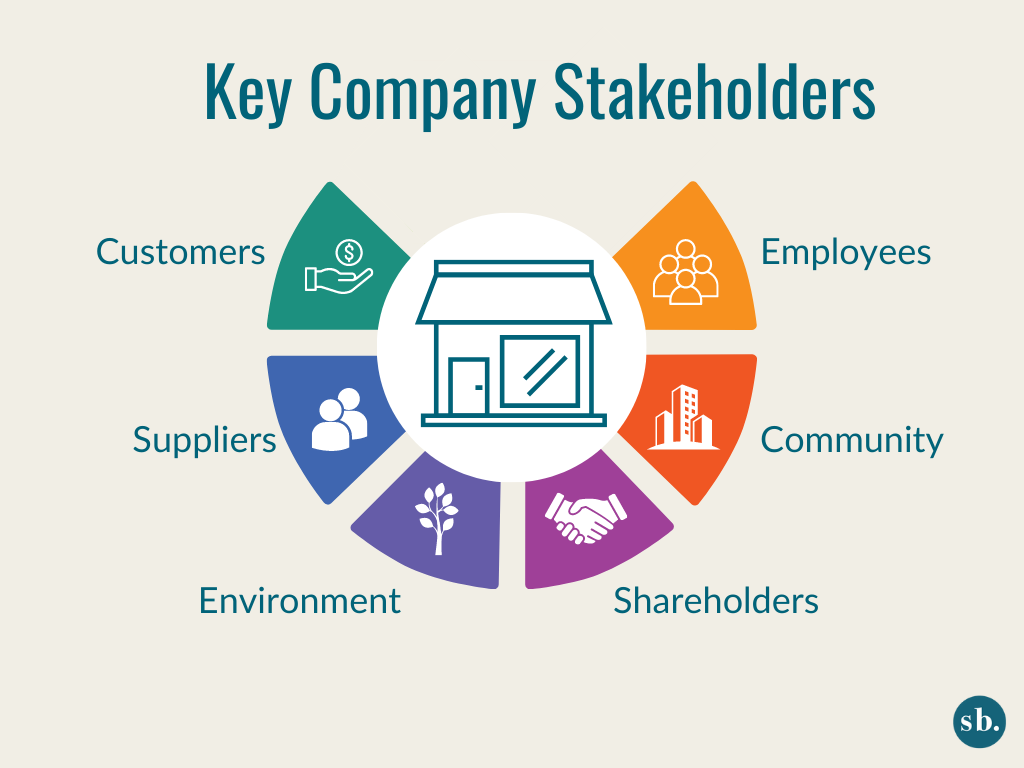What is a Stakeholder in Business?
Dec 07, 2022
By Meghan French Dunbar
With recent statements from business titans like Salesforce’s CEO Marc Benioff and Blackrock’s CEO Larry Fink that stakeholders are critical to the long-term value of a company and the future of capitalism, the term “stakeholder” has rightly become the buzzword du jour. So what exactly is a stakeholder in business? Despite its newfound popularity, many people don’t quite know what the term stakeholder means in the context of business and why it’s so important. Here’s the breakdown.
What is a Stakeholder in Business?
Business stakeholders include any person or entity that is either impacted by or has an impact on a business.
An internal stakeholder is any person or entity who has a direct relationship with the business, such as team members, board members, owners, and investors. External stakeholders include any person or entity that has an indirect relationship with the business, including customers, vendors, communities, the environment, and more.
Regardless of orientation, all company stakeholders contribute to the creation of value for the business; therefore, it's vital that they share fairly in the distribution of that value.
Who Are the Key Stakeholders in Your Company?

Each business has at least the following six key stakeholders:
-
Customers: Without them, your business would quickly fail. The more value you can create for them, the more likely they are to be loyal and enthusiastic promoters of your company and its products.
-
Team/Employees: Far more than “a factor of production,” employees are human beings. When you provide value for them through things like fair pay, benefits, some measure of input, autonomy in their role, meaningful work, and enthusiastic recognition, you’ll tap a power source that can dramatically increase engagement, job satisfaction, work quality, and productivity. They’ll take great care of your other stakeholders, too.
-
Suppliers/Vendors: The people and companies that provide you with the products and services you need to do business are critical — and often overlooked — stakeholders. Rather than shrewdly negotiating lower prices, doing what you can to help your suppliers achieve success in their own endeavors pays off in preferred treatment, faster service, and increased collaboration and innovation.
-
Society/Community: There are companies so bad at creating value for their own community that communities actively organize to keep them out; the opposite is also true. Creating value for the community (or communities) where you do business can pay off through word-of-mouth endorsements, high-profile acknowledgments, and collaborative relationships with leaders of other organizations in your community.
-
Environment: Clean air, clean water, and a nice place to live and work are not traditional business concerns, which is largely why we find ourselves in our present ecological situation. Creating value for the environment-at-large at a local, if not global, level may pay the greatest dividends of all by ensuring that future generations have the resources to meet their own needs. Vigilant attention to the efficient use of resources can provide direct value to your organization in this generation, too, through increased efficiency, reduced cost, and enhanced brand recognition.
-
Shareholders: Like every other key stakeholder, an organization must create value for its owners and financiers. Value can be paid in money, to be sure, but don’t underestimate non-monetary value. Shareholders are people too, and while they certainly often expect a return on their investment, they may also be happy to grant you more favorable terms if they can see your organization is also making a positive impact in other ways.
In addition to these six key company stakeholders, many businesses also consider other stakeholders like employees’ families, the media, government, trade associations, and even other companies in their same industry who traditionally would be viewed as competitors.
Why Shift Focus from Shareholders to Stakeholders?
As the business community transitions their focus from shareholders to stakeholders, the critical difference centers on company stakeholders. In the new business paradigm, businesses that create the most long-term value are the ones who generate the most value for as many of their stakeholders as possible, not just shareholders as the old paradigm instructed. Fortunately, it creates a virtuous cycle where the new standards of organizational performance will revolve around how much positive impact companies have — not just how much money they make.
It’s up to each business leader to think of significant ways to benefit their respective stakeholders and decide which stakeholders to prioritize when — and a company’s purpose is often the best guide. One thing is certain, though: the future of business relies on having deep relationships with all of your stakeholders. It's time to ask yourself whether or not you do.
